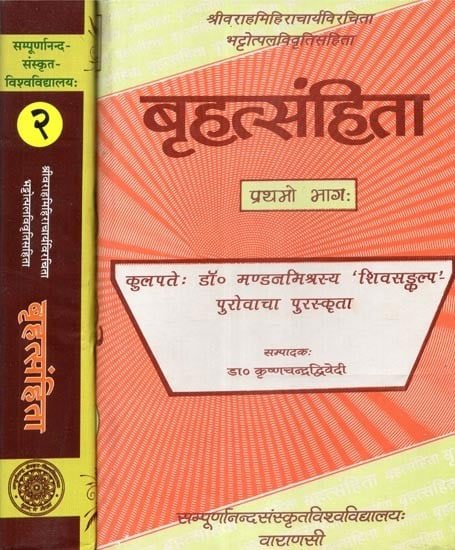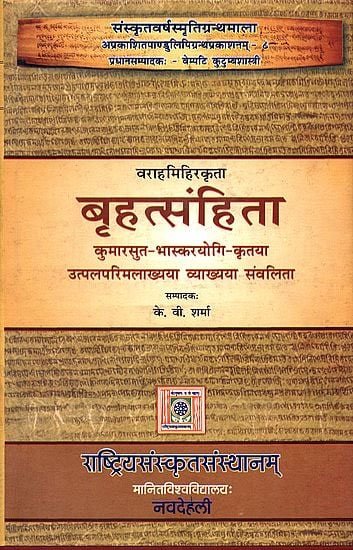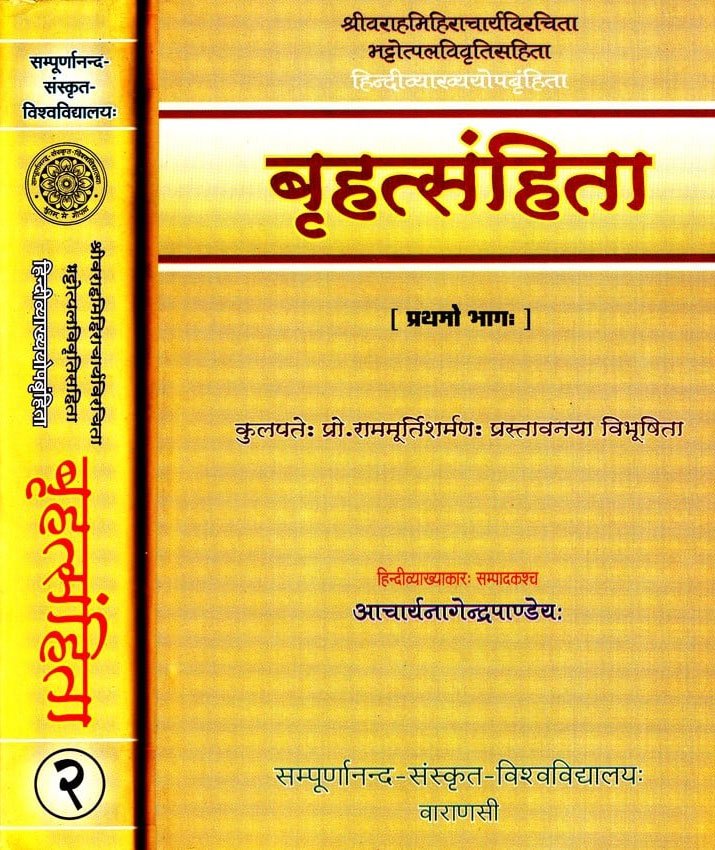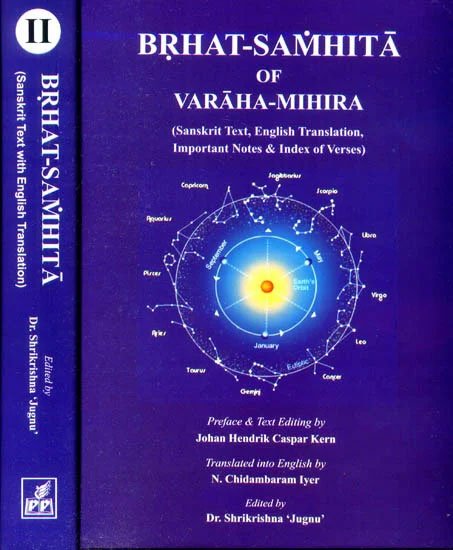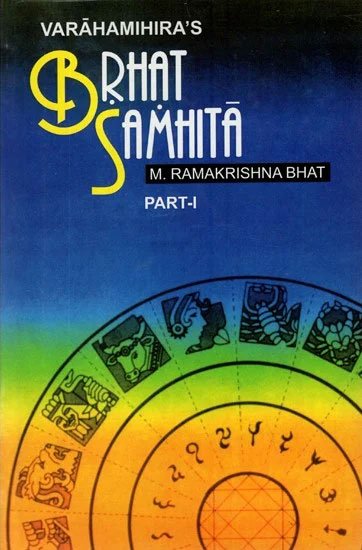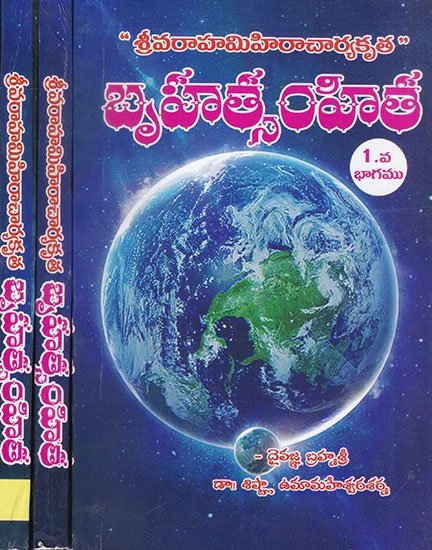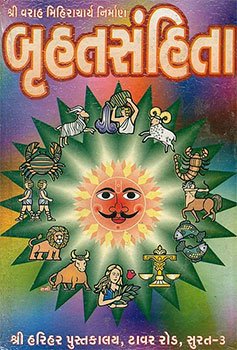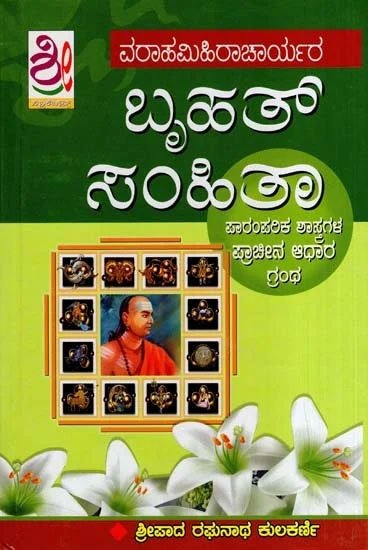Brihat-samhita [sanskrit]
26,560 words
The Sanskrit text of the Brihat-samhita from the 6th-century authored by Varaha Mihira in present-day Ujjain, India. It primarily deals with astrology and astronomy but is presented as an encyclopedia of knowledge.
Verse 21.04
किं वातः परमन्यच्छास्त्रज्यायो अस्ति यद्विदित्वैव ।
प्रध्वंसिन्यपि काले त्रिकालदर्शी कलौ भवति ॥ ०४ ॥
[शास्त्रं ज्यायो]
kiṃ vātaḥ paramanyacchāstrajyāyo asti yadviditvaiva |
pradhvaṃsinyapi kāle trikāladarśī kalau bhavati || 04 ||
[śāstraṃ jyāyo]
The Sanskrit text of Verse 21.04 is contained in the book Brihata Samhita (Sanskrit Text with Hindi Translation) by Pandit Achyutananda Jha. This book is available online or you could buy the latest edition:
Read online Buy now! The Sanskrit text by Pandit Achyutananda Jha (2001)
Glossary of Sanskrit terms
Note: This extracts Sanskrit terms and links to English definitions from the glossary, based on an experimental segmentation of verse (21.04). Some terms could be superfluous while some might not be mentioned. Click on the word to show English definitions.
Kim, Vatri, Vata, Vat, Parama, Nyaccha, Astri, Astra, Asti, Yat, Yad, Pradhvamsin, Pradhvamsini, Api, Kale, Kala, Trikaladarshin, Kali, Bhavati, Bhavat, Bhavant,
Analysis of Sanskrit grammar
Note: this is an experimental feature and only shows the first possible analysis of the Sanskrit text (Verse 21.04). If the system was successful in segmenting the sentence, you will see of which words it is made up of, generally consisting of Nouns, Pronouns, Verbs, Participles and Indeclinables. Click on the link to show all possible derivations of the word.
- Line 1: “kiṃ vātaḥ paramanyacchāstrajyāyo asti yadviditvaiva ”
- kim -
-
kim (indeclinable interrogative)[indeclinable interrogative]kim (indeclinable)[indeclinable]kim (pronoun, neuter)[nominative single], [accusative single]
- vātaḥ -
-
vātṛ (noun, masculine)[vocative single]vāta (noun, masculine)[nominative single]√vā -> vāta (participle, masculine)[nominative single from √vā class 2 verb], [accusative plural from √vā class 2 verb], [ablative single from √vā class 2 verb], [genitive single from √vā class 2 verb]√vā -> vāt (participle, neuter)[ablative single from √vā class 2 verb], [genitive single from √vā class 2 verb]√vā -> vāt (participle, masculine)[accusative plural from √vā class 1 verb], [ablative single from √vā class 1 verb], [genitive single from √vā class 1 verb]√vā -> vāt (participle, neuter)[ablative single from √vā class 1 verb], [genitive single from √vā class 1 verb]√vā (verb class 2)[present active third dual]√vā (verb class 1)[present active third dual]
- parama -
-
parama (noun, masculine)[compound], [vocative single]parama (noun, neuter)[compound], [vocative single]
- nyacchā -
-
nyaccha (noun, neuter)[compound], [vocative single]
- astra -
-
astṛ (noun, masculine)[compound], [adverb]astṛ (noun, neuter)[compound], [adverb], [nominative single], [vocative single], [accusative single]astra (noun, neuter)[compound], [vocative single]
- ajyāyo -
-
- asti -
-
asti (noun, feminine)[compound], [adverb]astī (noun, masculine)[adverb], [vocative single]astī (noun, feminine)[compound], [adverb], [vocative single]astī (noun, neuter)[compound], [adverb], [nominative single], [vocative single], [accusative single]√as (verb class 2)[present active third single]
- yad -
-
yat (indeclinable relative)[indeclinable relative]yat (noun, masculine)[compound]yad (noun, masculine)[compound], [adverb], [nominative single], [vocative single]yat (noun, neuter)[nominative single], [vocative single], [accusative single]√i -> yat (participle, neuter)[nominative single from √i class 2 verb], [vocative single from √i class 2 verb], [accusative single from √i class 2 verb]yat (pronoun, neuter)[nominative single], [accusative single]
- viditvai -
-
√vid -> viditvā (absolutive)[absolutive from √vid]
- aiva -
-
√i (verb class 2)[imperfect active first dual]
- Line 2: “pradhvaṃsinyapi kāle trikāladarśī kalau bhavati || 04 |”
- pradhvaṃsinya -
-
pradhvaṃsinī (noun, feminine)[compound], [adverb], [nominative single], [vocative single]pradhvaṃsin (noun, masculine)[locative single]pradhvaṃsin (noun, neuter)[nominative dual], [vocative dual], [accusative dual], [locative single]
- api -
-
api (indeclinable preposition)[indeclinable preposition]ap (noun, neuter)[locative single]
- kāle -
-
kāle (indeclinable)[indeclinable]kāla (noun, masculine)[locative single]kāla (noun, neuter)[nominative dual], [vocative dual], [accusative dual], [locative single]kālā (noun, feminine)[nominative dual], [vocative single], [vocative dual], [accusative dual]
- trikāladarśī -
-
trikāladarśin (noun, masculine)[nominative single]
- kalau -
-
kala (noun, masculine)[nominative dual], [vocative dual], [accusative dual]kali (noun, masculine)[locative single]
- bhavati -
-
bhavatī (noun, feminine)[adverb], [vocative single]bhavat (noun, masculine)[locative single]bhavat (noun, neuter)[locative single]bhavant (pronoun, masculine)[locative single]bhavant (pronoun, neuter)[locative single]√bhū (verb class 1)[present active third single]
- Cannot analyse 04
Other editions:
Also see the following editions of the Sanskrit text or (alternative) English translations of the Verse 21.04
Brhatsamhita with the Commentary of Bhattotpala
by Krishna Chandra Dwivedi (2016)
Publisher: Sampurnanand Sanskrit University; 1229 pages;
Buy now!
Brihat Samhita with the Commentary of Utpalapatimala of Yogisvara
by K. V. Sharma (2012)
Publisher: Rashtriya Sanskrit Sansthan, Janakpuri; 754 pages; ISBN-10; 8186111360; ISBN-13: 9788186111369
Buy now!
Brihat Samhita (Hindi Translation)
by K. V. Sharma (2002)
Publisher: Sampurnanand Sanskrit University; 2359 pages; ISBN-13: 9789387890008.
Buy now!
Brhat Samhita (English translation)
by N. Chidambaram Iyer (2022)
Publisher: Parimal Publication Pvt. Ltd.; 801 pages; Edited by Dr. Shrikrishna Jugnu; ISBN-10: 8171104215; ISBN-13: 9788171104215.
Buy now!
Brhat Samhita (English with notes)
by M. Ramakrishna Bhat (2010)
Publisher: Motilal Banarsidas Publishers Pvt. Ltd.; 1155 pages; ISBN-10: 8120810600; ISBN-13: 9788120810600.
Buy now!
Brhat Samhita (Telugu translation)
by Sishtla Umamaheswara Sharma (2020)
Publisher: Mohan Publications, Andhra Pradesh; 846 pages.
Buy now!Preview of verse 21.04 in Kannada sript:
ಕಿಂ ವಾತಃ ಪರಮನ್ಯಚ್ಛಾಸ್ತ್ರಜ್ಯಾಯೋ ಅಸ್ತಿ ಯದ್ವಿದಿತ್ವೈವ ।
ಪ್ರಧ್ವಂಸಿನ್ಯಪಿ ಕಾಲೇ ತ್ರಿಕಾಲದರ್ಶೀ ಕಲೌ ಭವತಿ ॥ ೦೪ ॥
[ಶಾಸ್ತ್ರಂ ಜ್ಯಾಯೋ]
Brhat Samhita (Gujarati translation)
by - (2000)
Publisher: Shree Harihar Pustakalay, Surat; Author: Shri Varahamihira Acharya (શ્રી વરાહમિહીરાચાર્ય); 432 pages.
Buy now!Preview of verse 21.04 in Gujarati sript:
કિં વાતઃ પરમન્યચ્છાસ્ત્રજ્યાયો અસ્તિ યદ્વિદિત્વૈવ ।
પ્રધ્વંસિન્યપિ કાલે ત્રિકાલદર્શી કલૌ ભવતિ ॥ ૦૪ ॥
[શાસ્ત્રં જ્યાયો]
Brhat Samhita (Kannada translation)
by Sripada Raghunatha Kulkarni (2021)
Publisher: Srinidhi Publications, Bangalore; 668 pages with illustrations.
Buy now!Preview of verse 21.04 in Kannada sript:
ಕಿಂ ವಾತಃ ಪರಮನ್ಯಚ್ಛಾಸ್ತ್ರಜ್ಯಾಯೋ ಅಸ್ತಿ ಯದ್ವಿದಿತ್ವೈವ ।
ಪ್ರಧ್ವಂಸಿನ್ಯಪಿ ಕಾಲೇ ತ್ರಿಕಾಲದರ್ಶೀ ಕಲೌ ಭವತಿ ॥ ೦೪ ॥
[ಶಾಸ್ತ್ರಂ ಜ್ಯಾಯೋ]
![Brihat-samhita [sanskrit] - book cover](/uploads/a/Brihat-Samhita-Sanskrit.jpg)
